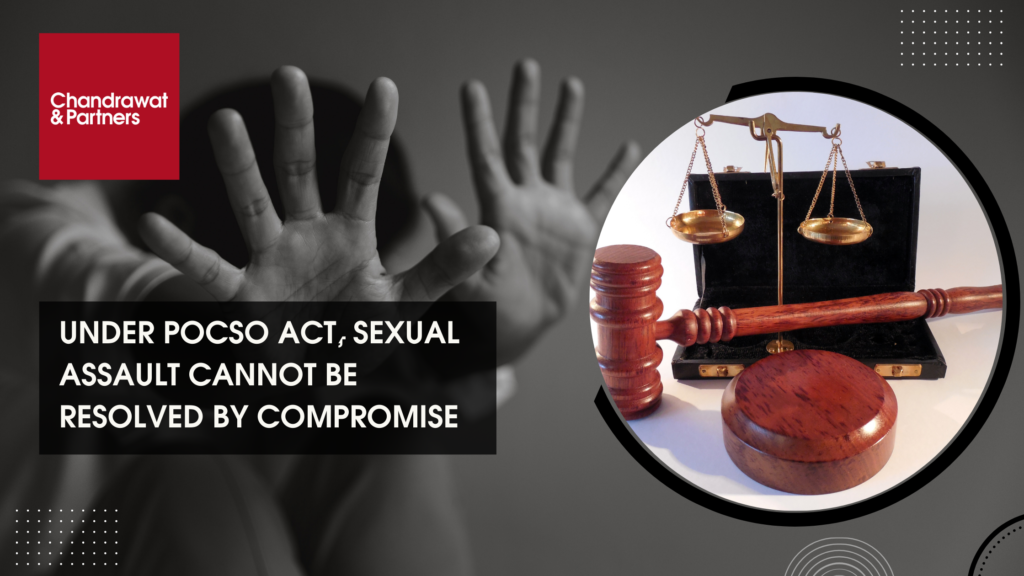Home > Recent Judgements > Under Pocso Act, Sexual Assault Cannot Be Resolved By Compromise
Nov 08, 2024

BACKGROUND
In the case of Ramji Lal Bairwa & Anr. versus State of Rajasthan & Ors., the Court entertained a petition brought by the third party/appellant to the criminal proceedings who challenged the decision of the High Court asserting that heinous crime, especially with regard to minors and sexually related offences, are not matters that can be reconciliatory in nature and be laid to rest as such.
The description of the accusation against the teacher was that he used his hands to rub the minor child’s breasts in the absence of anyone else in the classroom. The victim was last seen after being screamed at to keep quiet when she attempted to report the attack to her other teachers. Anyway, the police complaint was filed against the teacher under sections of Indian Penal Code (“IPC”), the Protection of Children from sexual offence (“POCSO”) Act and Scheduled Caste(“SC”)/Scheduled Tribe(“ST”) Act. But here, the teacher and the family of the victim arrived at a compromise, and the First Information Report (“FIR”) was quashed by the Rajasthan High Court.
Section 7 of the POCSO Act 2012: Whoever, with sexual intent touches the vagina, penis, anus, or breast of the child or makes the child touch the vagina, penis, anus or breast of such person or any other person, or does any other act with sexual intent which involves physical contact without penetration is said to commit sexual assault.
ISSUES
- Whether an offence involving sexual assault can be treated as a private dispute eligible for compromise-based quashing?
- Whether the third party/appellant has the locus standi to challenge the High Court’s quashing of the FIR?
- Whether the High Court properly exercised its duty in assessing the impact of the alleged crime on society while considering the compromise?
JUDGEMENT
The Supreme Court set aside the order of the Rajasthan High Court which had quashed a complaint of sexual assault against one of the teachers who had been accused under the POCSO Act. Referring to the first circumstance, the High Court noted that it was the result of a compromise between the father of the victim and the accused teacher. This earned the utmost disagreement of the Supreme Court. The Court emphasized that sexual assault that which occurs in a school environment between a teacher and a minor pupil, is not a dispute capable of settlement even for the complainant by means of cross-bargaining in a compromise agreement. Such crimes may be regarded as individual disagreements, although they have much larger ramifications and are a threat to society.
The Court concluded that quarrels in sexual assault cases are huge institutions and involve the larger public hence, they cannot be settled through non litigation because parties have agreed on settlements. It is not the case of the parties only but of the legal order which concerns law and its enforcement. The Supreme Court stated that the case should have been heard by the High Court to determine if it makes sense to resolve a conflict through a compromise to achieve justice before the case is ordered to be quashed. In the present case, the High Court did not determine properly what was the case about.
The Supreme Court turned down the argument spearheaded by the respondent, which stated that the appellant who is a third party, could not competently challenge an order quashing the FIR. It ruled that the offense was of such nature as enabled the third party to appeal on behalf of society as the accused should be made to stand trial. The High Court was referring to a case of Gian Singh v. State of Punjab (2012) to justify the quelling of the private disputes, but the Supreme Court explained that the present case was about social damage, so compromise in the context of quelling the dispute was not relevant.
OBSERVATION
Appealing the order of the High Court, the Supreme Court ordered that the criminal prosecutions in the case against the accused should go on. The Most Important jurisdiction of the Court, is in protection of the interest of the public, in that it considers every one of such POCSO Act cases with significance, hence such cases should not just end up being dismissed by means of a compromise of parties to the suit.
For more information or queries, please email us at
enquiries@chandrawatpartners.com




